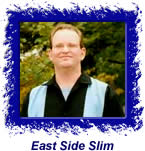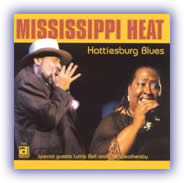 By
East Side Slim By
East Side Slim
 Mississippi
Heat – Hattiesburg Blues Mississippi
Heat – Hattiesburg Blues
Delmark Records, 2008
Pierre Lacocque, the leader of the band, is an interesting
cat, besides being a master harp player from the Walter
Horton school of playing. Pierre born in Israel of
Christian Belgian parents, moving to Germany and France
at an early age, returning to the family’s native
Belgium by the age of 6 (around 1957.) Pierre’s
father (a Protestant minister and eventual world-famous
Old Testament Biblical scholar) enrolled Pierre and
his siblings in a Jewish Orthodox school in order
to learn of the Jews suffering and about Judaism in
general, including its philosophy and theology.
At
night Pierre listened (quietly!) to the radio, becoming
exposed to African-American artists such as Ray
Charles, Otis Redding and Aretha Franklin, instilling
in Pierre a love of R&B/Soul/Blues music. Eventually,
the family moved to Chicago for his father’s
career (1969 timeframe) where Pierre heard for the
1st time real blues music – and he was hooked,
especially after attending a concert where the harmonica
player happened to be Big Walter Horton. Pierre
was around 16 at this time. Immediately after this
concert learning the harp become an obsession for
Pierre, with it being usual for him to practice
6 hours or more a day.
Around
1970 Pierre moved to Montreal to attend college,
and here he joined his 1st blues band. He stayed
in Montreal for 6 years, going to school and playing
in bands at night, but at 24 years of age he moved
back to Chicago. He chose to go the “intellectual
route”, furthering his education and working
as a clinical psychologist in order to support his
family, foregoing the music he loved so much. But,
around 1988, the continual tug of the music became
too much to ignore – he realized he missed
playing the blues. So, at 36 years of age, he began
playing out again, eventually forming Mississippi
Heat around 1991-92 with Bob Covington, Billy Flynn,
James Wheeler and Bob Stroger. From the start the
band had an emphasis – or mission, really
– of resurrecting the vintage 1950s-style
ensemble blues band sound.
Mississippi
Heat has had a constantly revolving membership -
other than Pierre Lacocque. Past members of the
group include: Robert Covington, Billy Flynn, James
Wheeler, Bob Stroger, Deitra Farr, Allen Kirk, Mary
Lane, Zora Young, and Barrelhouse Chuck –
pretty much a who’s who of contemporary Chicago
blues. The band has been releasing albums on several
different labels since the early 1990s. They released
CDs on the Van der Linden label through most of
the 1990s, moving to Crosscut in 2002 for a couple
of releases, then to Delmark in 2005. “Hattiesburg
Blues” is the band’s 2nd release on
Delmark.
The
Songs --
1. Tiger Man: Nothing but straight
ahead ensemble blues heard here – as it should
be! This is a great shuffle tune with fun double
entendre lyrics. Inetta Visor’s vocals here
remind me very much of Katie Webster in her swamp
boogie queen mode. That’s meant as the utmost
compliment, as Katie was one of my favorite artists
(RIP). Oh, and the harp playing is mighty fine,
too!
2.
Chicago Is My Home: This song features
a guest spot by Lurrie Bell on vocals and on lead
guitar. Lurrie has been a member-emeritus of Mississippi
Heat for years and was brought into this project
to contribute to this song and to “Gone So
Long”. This song is a strong shuffle very
much in the style of Magic Slim. While at first
listen it might sound like there isn’t that
much going on, open your ears wide-open and give
a listen to all the musicians. Perfect ensemble
blues – you don’t notice everyone because
the whole sounds so fine!
3.
Forgot You Had A Home: This one is a slow,
simmering blues featuring Inetta on vocals again,
still sounding like Katie Webster with maybe a little
Irma Thomas thrown in for good measure. Pierre uses
his harp more like a horn, both as a solo instrument
and as a rhythm instrument. In addition, there’s
a full horn section used on the track. This is a
nice change of pace and a very solid tune in its
own right.
4.
How Much Worse Can It Be?: This is the
first of several tunes on the CD bearing a marked
Latin influence – possibly due in part to
the fact that Pierre has been married to a Cuban-American
woman for 30-some years. You’ve got a nice
rumba groove going on, with Latin percussion (courtesy
of guest Ruben Alvarez) really spicing up the mix.
There’s some very nice harp work to be heard
here, understated, always in control, but with killer
tone! Giles Corey’s lead guitar work is a
lot of fun to listen to here as well. Corey is the
band’s actual guitar player on this album,
and his work is good enough that neither Lurrie
Bell nor Carl Weathersby really needed to be brought
in. I think we’ll be hearing more from this
bluesman, as he’s also a great vocalist (check
out track 11 – “Say Something Good”.)
5.
Soft-Hearted Woman: We’ve got a nice
mellow shuffle here, one of those gentle tracks
that just makes you feel good while listening to
it. Of course, the lyrics are deceptive as they
are anything but gentle in meaning - sweet and sour
chicken is similar that way…but I digress.
Inetta is telling her no-good man to take his bags
on out of her door to never return. Again, you hear
the great tone Lacocque has on harp; he plays mostly
in the background here. He really is a master player.
6.
Hattiesburg Blues: This is the 2nd Latin-influenced
song on the CD. Frankly, it’s very cool! The
harp is playing parts you could just about hear
a trumpet or accordion playing, and Inetta does
a very nice job with the vocals. Turn this up loudly
enough to be able to hear all the little percussion
touches – it’ll be worth the ire of
your neighbors – cha cha cha.
7.
Gone So Long: This song is the 2nd feature
for Lurrie Bell, although the piano player (Chris
“Hambone” Cameron) pretty much steals
the show. Lurrie’s voice is beginning to sound
more like Magic Slim’s or like Lurrie’s
father’s (Cary Bell) as he gets older. This
is a quick shuffle with stinging guitar, barrelhouse
piano, and chugging rhythm harp. Enjoy – I
did!
8. Light From Within: The band
is slowing things down here a little bit, playing
another slow blues anchored by Inetta’s vocals.
She really shines on this sort of tune as her voice
is very expressive. There have been a lot of women
vocalists come through Mississippi Heat’s
line-up over the years, but I think Ms. Visor might
be the best - or at least the best match - yet.
This song also features a wonderful harp solo from
Pierre near the 3:30 mark; he reminds me very much
of Walter Horton style-wise. Walter Horton was The
Man on harp; don’t let anyone tell you differently.
9.
Calypso In Blue: Needless to say, this
is the 3rd Latin blues on the album, but this time
it’s an instrumental track. It is a calypso-style
tune for sure, and it features the organ and harp.
Listen to the very cool unison playing that occurs
with harp and organ near the beginning of the song;
the harmonics of the dual sound gives me chills!
I sure wish I could play harp like this guy…
After some dual playing each player, as well as
the other band members, are given solo runs of their
own. This song could go on for 15 minutes and remain
fresh sounding. Excellent!
10.
Hell And Back: This song is of a more contemporary
blues variety, with the vocals and lead guitar taken
by guest Carl Weathersby (he play rhythm or lead
on every track on this CD.) He employs a stinging
single-note style of playing, and is a fine singer.
Carl’s been making his own albums for years,
and has been a frequent contributor to Mississippi
Heat’s work. Frankly, I think he sounds at
his best when playing with ‘Heat, as the band
members are incredibly talented and are very sympathetic
players – they help to pull out Carl’s
best work.
11.
Say Something Good: On this song, band
guitarist Giles Corey takes the lead vocal, and
takes it very well! As stated earlier in this review,
Corey is a talent to keep an eye on. This tune has
a sort of funky southern feel in the vein of a BobbyRush
number, only with a tougher, rawer edge to it thanks
to Corey’s tough guitar work. Pierre really
shines on harp here, too, both on lead and on rhythm.
He’s an expert rhythm harp player, which has
become sort of a lost art over the years.
12.
Foolish Man: This song is B.B. King-styled
tune, with guest vocals by Devin Thompson and guitar
solos courtesy of Carl Weathersby. The song has
nice dynamics, passionate singing, cool horn charts
and gurgling organ. It really reminds me of something
Weathersby and Billy Branch would have done back
in the day with their S.O.B. (Sons of the Blues)
band. This is a good tune.
13.
Nature Is Cryin’: This set closer
brings Inetta Visor back to the vocal chair, singing
a message song about the how mankind is destroying
the planet. Years ago message songs were very common
in blues music, but after the mid 1950s or so they
become much less common, falling out of fashion
to feel-good danceable music. The musical backing
to this song is in a funky blues style with bleating
horns, electric piano (or clavinet?), and a head-bobbing
beat. I love the clavinet – remember Stevie
Wonder’s funky early to mid 1970s songs, such
as “Superstition”? That’s clavinet!
The
Verdict:
I’ve been listening to Mississippi Heat’s
music for years now, and I honestly think this is
their best album (CD, record, whatever…!)
Bandleader Pierre Lacocque always emphasizes an
ensemble sound, and he’s achieved it on a
grand scale with this CD. In addition, it contains
the usual high production values associated with
Delmark releases – it sounds great! The guest
players, such as Lurrie Bell, Carl Weathersby, Rubin
Alvarez and Devin Thompson, all add their own special
talents to the project, without taking away from
Mississippi Heat’s band mission.
Pierre
Lacocque is one of the best harmonica players in the
world and should really be better known, but he’s
not a flashy player as a rule so maybe that prevents
him from attaining more notoriety. His playing is
in a style similar to players like Big Walter Horton
and Lee Oskar – tone is king, rather than flash
and volume. I can’t sign-off without mentioning
the vocal work of Inetta Visor. She’s an incredible
vocalist, with a definite resemblance vocally to Katie
Webster. Mississippi Heat has almost always featured
female vocalists, and Inetta might be the best of
the bunch; she a good ‘un! Well, it’ time
to rate this album - I’m giving this one a 4.00
on the STLBluesometer.
Lee Howland,
aka "East
Side Slim"
|
